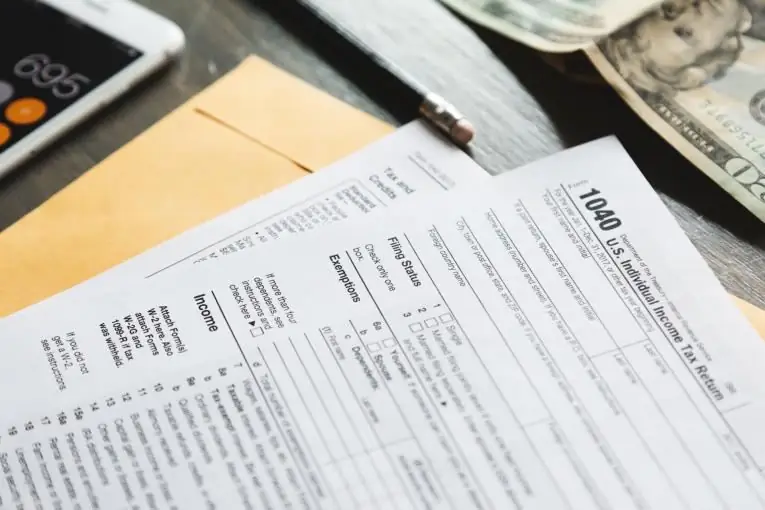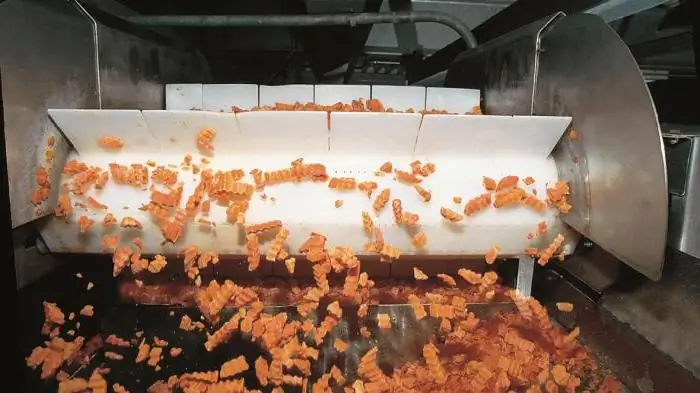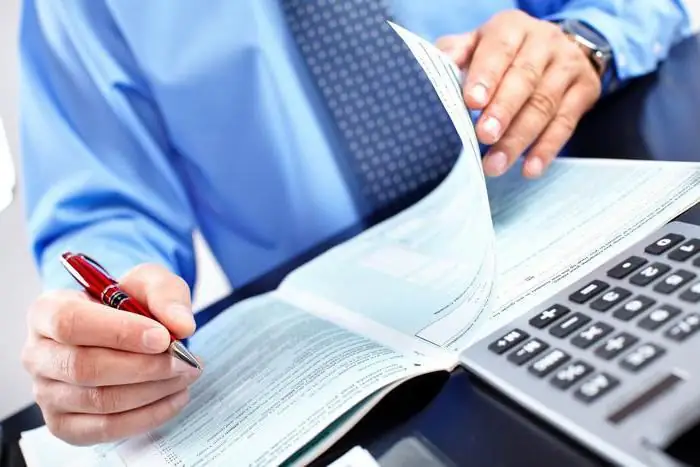2026 Author: Howard Calhoun | calhoun@techconfronts.com. Last modified: 2025-01-24 13:10:28
The right to accept VAT deductible allows you to reduce the tax calculated for the quarter. However, it can be used under certain conditions. Consider them in detail.

VAT features
Outwardly, this tax resembles a deduction from sales or turnover. The seller adds a certain amount to the cost of goods, works, services sold. However, there is one important difference. It consists of the following.
If the buyer also pays VAT, the seller, calculating the amount of obligations to the budget, can deduct from the tax received from the buyer the amount paid by him to his supplier. As a result, the burden of deducting VAT to the budget rests with consumers.
Why do I need VAT?
The introduction of value added tax ensuressolving multiple problems.
Firstly, the distribution of VAT deductions to the budget between several stages of the production cycle helps to prevent a cascade effect, i.e., multiple tax collection on the same cost.
Secondly, the distribution of the VAT burden between different entities reduces the risk of tax evasion.
Thirdly, such a system of taxation allows you to remove "national" taxes.
Objects of taxation
They are recognized as:
- Sale of services, works, goods in Russia. Among other things, it recognizes the sale of "collateral", the transfer of goods under an agreement on compensation or innovation, the transfer of property rights, ownership of objects, results of work or the provision of services free of charge.
- Transfer of objects on the territory of the Russian Federation for the company's own needs, the costs of which are not deductible (including when calculating depreciation) when calculating income tax.
- Construction and installation works for own needs.
- Import of products to Russia and other territories under the jurisdiction of the Russian Federation.
General conditions for accepting VAT deductions
They are enshrined in Art. 171 NK. According to the norm, there are three conditions for accepting VAT for deduction:
- Supplier filing tax.
- Acquisition of services, works, goods for transactions subject to VAT (also for resale), and their registration.
- Getting a valid invoice.
Acceptance of objects for accounting
Posting of goods, works, property rights and services must be confirmed by documents. To accept VAT for deduction, the actual cost of, for example, materials is reflected in the account. 10, goods - on the account. 41, services/works - on accounts 20, 26, 44, 25.
All completed transactions should be confirmed by primary documentation.
Reflection behind the balance
When registering off-balance sheet objects that the enterprise cannot use under the terms of the contract, VAT is not deductible. This is due to the fact that the company cannot use the relevant assets in taxable transactions. The corresponding provision follows from paragraph 2 of Art. 171 and paragraph 1 of Art. 172 NK.
If the contract does not provide for a ban on the use of objects, then the legislation allows the acceptance of the amount of VAT for deduction. The Ministry of Finance explains this by saying that in this case, the transfer of ownership of the object does not matter. In ch. 21 of the Tax Code there are no provisions on where exactly an asset should be accounted for - on the balance sheet or off it. Such clarifications were given by the Ministry of Finance and the Federal Tax Service in letters No. 03-07-11/68585 and No. GD-4-3/911, respectively. This position is also confirmed by judicial practice.

Goods on the way
If the objects have not yet been delivered to the enterprise, respectively, they have not yet been capitalized by the accountant. Even if one of the other conditions for accepting VAT for deduction is met, this cannot be done. That is, the company can have both a properly executed invoice and a primary invoice.documentation, but there is no actual asset.
Deduction transfer
Is it possible? Yes, it's possible. Consider an example. Assume that the company has met all the conditions for accepting VAT for deduction in the current period. It has the right to transfer deductions, but for those objects that are provided for in paragraph 2 of Art. 171 NK. This is, in particular, about goods, works, services purchased for the export of non-primary products. In all other cases, deductions for assets used in transactions subject to VAT are not carried over.
For a better understanding of the situation, here is a list, enshrined in paragraph 2 of Art. 171 NK. You can transfer VAT:
- Reported by contractors when purchasing materials for construction and installation works and during capital construction.
- Paid upon importation into Russia. You can transfer, including deductions for costs associated with the export of non-primary products. This provision follows from paragraph 3 of Art. 171 NK. In such cases, the general procedure for deductible VAT is applied, which does not depend on export confirmation.
- Paid when importing products from the EAEU countries.
In all the above cases, the period for accepting VAT for deduction is 3 years. The calculation of the period starts from the date of registration of objects.

Nuances
The three-year period must be counted to the end of the quarter. It should not be extended for the period allotted for the submission of the declaration. This position is held by the COP.
Simply put, the accountant needs to do the following. It is necessary to count 3 years from the date of registration of objects on the basis of primary documents. The last date in the quarter in which this period fell will be the last day. The accountant will show the moment of accepting VAT for deduction in the declaration (or update) for the previous quarter or for the current one (if the company does not plan to perform any business operations).
Let's consider an example. Suppose an LLC purchased goods at a cost of 118 thousand rubles. (including VAT 18 thousand rubles). The objects were registered on June 23, 2016. The accountant decided to transfer the deduction. The three-year deadline for filing a declaration will expire on June 30, 2019. The accountant will submit an updated report for the first quarter of 2019 and declare a deduction in it in the amount of 18 thousand rubles. But he will submit the declaration for the second quarter already without the specified amount.

Important moment
The basis for accepting VAT deductible within 3 years is the import of products from the EAEU countries. However, there is one limitation here. In addition to the day of posting the objects, the accountant must take into account the date of setting the mark on the payment of tax in the application for import. If not, then the deduction cannot be applied. This is stated in the letter of the Ministry of Finance No. 03-07-13/1/38180.
Partial deduction
For 3 years, the same invoice can be deducted for VAT in installments, i.e. in different quarters. This order is valid for:
- Long capital construction. In accordance with one invoice of the contractor, the customer can deduct VAT in parts indifferent tax periods within a three-year period. The corresponding explanations are contained in the letter of the Ministry of Finance No. 03-07-10 / 73279 of 2016
- Import of imported products into the Russian Federation. Exceptions are fixed assets and equipment intended for installation. In these cases, the invoice functions are performed by the customs declaration, as well as VAT receipts.
Please note that VAT paid in accordance with the customs declaration can also be accepted for deduction in parts, subject to the established conditions.

However, this rule can not be applied in all cases. In particular, it applies to deductions enshrined in paragraph 2 of Art. 171 NK. Second, the rules do not apply in case of purchase:
- Equipment for installation.
- Fixed assets.
- NMA.
A split deduction is not allowed when purchasing these assets. The entrance tax must be taken as a lump sum. However, the accountant can also do this within a three-year period from the moment the right to deduct arises.
Additional restrictions
Tax deductions provided for in paragraphs 3-14 of Art. 171 of the Tax Code, should be declared in the period in which the customer (purchaser) met the special conditions.
Please note that VAT acceptance cannot be rescheduled:
- from advances;
- in case of payment of VAT by the purchaser - tax agent;
- if the seller has charged tax on the received advance;
- if the property was received inas a contribution to capital and provided that the transferring economic entity has restored the tax on these objects.
Such restrictions follow from the provisions of paragraph 1.1 of Art. 172 NK. The Ministry of Finance also supports them.
Zero rate
In practice, it is impossible to transfer deductions to future periods during the operation of taxing VAT at a rate of 0%. This means that if the right to a benefit is confirmed by documents within the period established by law, the tax on services, products, works used in these production processes is presented at a time. The moment of acceptance is the day the tax base is determined.

As an exception to this rule, there are operations related to the export of non-commodity products. The deduction of input tax on objects acquired for their implementation can also be carried forward to future periods within a three-year period.
Error in reporting
It recognizes the incorrect reflection in the accounting documents of the facts of the financial and economic activities of the enterprise. If some information about the transactions performed was not indicated at all in the reporting, then this is also considered an error. In other words, if an accountant, due to oversight, negligence or other subjective reasons, made incorrect entries, did not reflect the facts of activity, incorrectly filled out the financial statements, then he made a mistake. The relevant provisions are enshrined in paragraph 2 of PBU 22/2010.
In the same paragraph of PBU, however, there is one significant reservation. In particular, omissions and inaccuracieswhen reflecting information about business transactions, discovered upon receipt of new data, are not considered an accounting error. What is this about? If, for example, the counterparty notifies the company that the primary documents previously submitted to them contain incorrect data, then the reflection of the corresponding operation in the accounting will not be considered an accountant's mistake. In this case, it's not his fault. If, upon receipt of new information, a fact of economic activity appears, it should be recorded as a new transaction, but not as an error.
Dating difficulties
What to do if the primary document was drawn up in 2017, and entered a year later? You can solve this issue like this.
If the primary documentation was received by the enterprise before the date of approval of the reporting for the past period, the costs are reflected in 2017. Accordingly, the accountant makes the following entry:
Dt sch. 20 (44, 91.2, etc.) Kt. 60 (76, etc.) - the amount of expenses of the current period is reflected.
If the documentation was received by the enterprise after the day the reporting was approved, the operation is reflected in the next year, 2018. It will not be considered an error to reflect costs later due to delay by the counterparty of the necessary documentation.
If expenses affect the financial results of activities, they should be included in other expenses. In this case, an entry is made in the accounting:
Dt sch. 91.2 Kt c. 60 (76, etc.) - a reflection of the amount of losses from previous periods.
If the costs do not affect financial results, they are reflected in accounting as if the primary documentation had been received atventure on time:
Dt sch. 20 (08, etc.) Kt c. 60 (76, etc.) - a reflection of the amount of costs of past periods.
Reimbursement specifics
If at the end of the tax period it turns out that the amount of deductions is greater than the amount of tax calculated on transactions recognized as objects of taxation, the difference is subject to reimbursement (refund, offset) to the payer.
After the business entity submits the declaration, the IFTS specialists will assess the validity of the amount claimed for reimbursement. For this, a background check is carried out. Upon its completion, within a week, the supervisory authority must decide on compensation for the corresponding amounts, if no violations have been identified.

If errors are found, facts of non-compliance with tax law, an act is drawn up. Together with other audit materials, this document is submitted to the head of the tax inspectorate that conducted the audit. Based on the results of their consideration, the head of the IFTS decides on the issue of bringing (non-bringing) the payer to responsibility for the violations committed. Along with this, one of the following decisions must be made:
- Refund the tax in full.
- Refuse compensation.
- Reimburse part of the claimed amount.
If there is a arrears in tax or other obligatory payments to the budget, arrears in fines (pen alties) payable or recoverable, the Federal Tax Service independently sets off the amounts to be reimbursed against these debts.
Recommended:
Accounting documents are The concept, rules for registration and storage of accounting documents. 402-FZ "On Accounting". Article 9. Primary accounting documents

Proper execution of accounting documentation is very important for the process of generating accounting information and determining tax liabilities. Therefore, it is necessary to treat documents with special care. Specialists of accounting services, representatives of small businesses who keep independent records should know the main requirements for the creation, design, movement, storage of papers
Insurance for 3 months: types of insurance, choice, calculation of the required amount, necessary documentation, filling rules, submission conditions, terms of consideration and is

Every driver knows that for the period of using a car he is obliged to issue an OSAGO policy, but few people think about the terms of its validity. As a result, situations arise when, after a month of use, a “long-playing” piece of paper becomes unnecessary. For example, if the driver goes abroad by car. How to be in such a situation? Arrange short-term insurance
Processing primary documentation: requirements, example. Primary accounting documentation

The activity of any enterprise is closely connected with the maintenance and processing of primary documentation. It is necessary for reporting, calculating tax payments, making management decisions
Meat: processing. Equipment for meat and poultry processing. Production, storage and processing of meat

Information of state statistics show that the volume of meat, milk and poultry consumed by the population has significantly decreased in recent years. This is caused not only by the pricing policy of manufacturers, but also by the banal shortage of these products, the required volumes of which simply do not have time to produce. But meat, the processing of which is an extremely profitable business, is very important for human he alth
Accounting and tax accounting at a manufacturing enterprise: definition, maintenance procedure. Normative accounting documents

In accordance with PBU 18/02, since 2003, the accounting should reflect the amounts arising from the discrepancy between accounting and tax accounting. At manufacturing enterprises, this requirement is quite difficult to fulfill. The problems are related to the difference in the rules for valuation of finished goods and WIP (work in progress)

